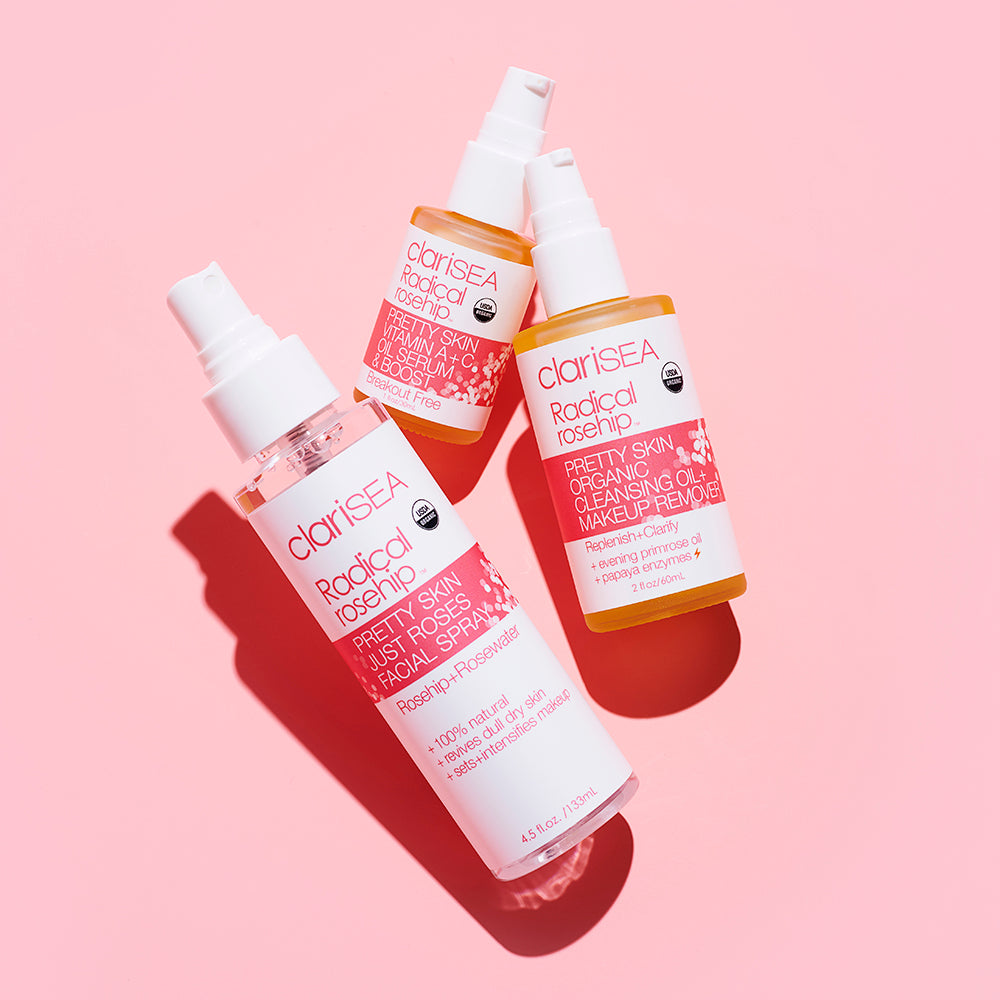
What Does USDA Organic Skincare Mean
You may have wondered what USDA Organic Certification means for a skincare product. It means exactly the same as it does for the USDA Organic food that you see, buy and eat. But the ingredients that can be used in USDA Organic products (food, skincare, etc.) are limited which can be hard when formulating the best possible skincare products for problem skin. That's why we only create USDA Organic products when it works, makes sense and helps deliver an even better experience and result for our customers.

For instance, creating a 100% natural & naturally derived Ocean Saltwater Clear Skin Cleanser made more sense than to create a USDA Organic water based cleanser. We needed more flexibility and ingredient choices to formulate the right water based cleanser for the line than USDA Organic protocols allow for. BUT it made total sense for our Pretty Skin Organic Cleansing Oil + Makeup Remover. I was able to identify the best ingredients for the formula and source them Organically. In order to create the USDA Organic collection, we had to work through a 2 year long Certification process. It's the real deal because (you may not know this) but USDA Organic Certification is actually ruled by law. Here is a rundown (after the pic) on what USDA Organic means according to the US Department of Agriculture:

"USDA certified organic foods are grown and processed according to federal guidelines addressing, among many factors, soil quality, animal raising practices, pest and weed control, and use of additives. Organic producers rely on natural substances and physical, mechanical, or biologically based farming methods to the fullest extent possible.
Produce can be called organic if it’s certified to have grown on soil that had no prohibited substances applied for three years prior to harvest. Prohibited substances include most synthetic fertilizers and pesticides. In instances when a grower has to use a synthetic substance to achieve a specific purpose, the substance must first be approved according to criteria that examine its effects on human health and the environment (see other considerations in “Organic 101: Allowed and Prohibited Substances”).
As for organic meat, regulations require that animals are raised in living conditions accommodating their natural behaviors (like the ability to graze on pasture), fed 100% organic feed and forage, and not administered antibiotics or hormones.
When it comes to processed, multi-ingredient foods, the USDA organic standards specify additional considerations. Regulations prohibit organically processed foods from containing artificial preservatives, colors, or flavors and require that their ingredients are organic, with some minor exceptions. For example, processed organic foods may contain some approved non-agricultural ingredients, like enzymes in yogurt, pectin in fruit jams, or baking soda in baked goods.
When packaged products indicate they are “made with organic [specific ingredient or food group],” this means they contain at least 70% organically produced ingredients. The remaining non-organic ingredients are produced without using prohibited practices (genetic engineering, for example) but can include substances that would not otherwise be allowed in 100% organic products. “Made with organic” products will not bear the USDA organic seal, but, as with all other organic products, must still identify the USDA-accredited certifier. You can look for the identity of the certifier on a packaged product for verification that the organic product meets USDA’s organic standards.
As with all organic foods, none of it is grown or handled using genetically modified organisms, which the organic standards expressly prohibit (see “Organic 101: What Organic Farming (and Processing) Doesn’t Allow”).
Becoming familiar with the USDA organic label and understanding its claims empower consumers to make informed decisions about the food they purchase. While there are many marketing claims that add value to foods, consumers can be assured that USDA organic products are verified organic at all steps between the farm and the store."
SHOP OUR USDA ORGANIC SKINCARE HERE
Sources referenced in this blog post: https://www.usda.gov/media/blog/2012/03/22/organic-101-what-usda-organic-label-means
